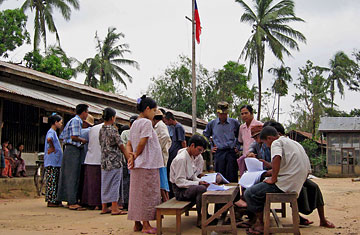
Burmese officials check voters lists for a national referendum at a polling station in northern Yangon on May 10
The last thing on Min Soe's mind was casting a vote. Cyclone Nargis had just razed his house and ravaged the rice paddies that were to provide half of his yearly income. Nearly all the other wooden shacks in his village of Too Chaung had also been annihilated by the storm. Then, on May 10, representatives from Burma's repressive military junta descended on the village. Were they coming to bring badly needed food, water and building materials to the people of Too Chaung? Hardly. Instead, the government men forced villagers to participate in a constitutional referendum that critics have labeled a sham dedicated to legitimizing the military's grip on power. Two days earlier, Min Soe shook his head when I asked whether the plebiscite, which Burma experts believe will be rigged if the results aren't to the ruling generals' liking, would go ahead in Too Chaung. "No, they cannot do so," he said, incredulous at my ridiculous question. "We can't vote when everything has been destroyed."
Apparently, the country's top brass disagreed. Although certain districts ravaged by the storm had their polls postponed until May 24, Too Chaung was declared one of the cyclone-struck regions that had already "returned to normalcy," as the government-run newspaper, The New Light of Myanmar, put it. That would be news to Too Chaung's residents, who were still tying together bamboo poles and palm fronds to build crude temporary shelters the day of the referendum. Villagers who voted in a nearby school filed out quietly afterward, hardly looking pleased about participating in what the junta has touted as a crucial step toward returning democracy to a nation that has been under military rule since 1962.
Forcing victims of Burma's worst natural disaster in modern history to participate in a referendum of questionable validity underscores the callousness of the Burmese regime. But the determination to hold the plebiscite also points to an even darker irony. A week after the cyclone devastated the Irrawaddy Delta, precious little aid is reaching the storm's victims. On Friday, in village after village, residents told me no aid at all had arrived. Blackened, bloated corpses still bobbed in rivers. Many storm survivors had no idea when they would be eating their next meal. NGOs began reporting outbreaks of diarrheal disease. By contrast, in other disaster sites like India or Indonesia after the 2004 tsunami, convoys of trucks, laden with both domestic and foreign supplies, swarmed the area within days. Perhaps Burma's generals could have been excused for the delay—after all, this is one of the world's poorest and most backward countries. Yet the efficiency with which the military has shepherded people to polling stations proves that the junta has plenty of organizational capacity. But for Burma's junta, saving the lives of cyclone Nargis' victims isn't as big a priority as conducting a sham vote. The heartlessness is staggering.
Even in the state-run newspapers, stories about the cyclone shared ample space with articles extolling the glories of conducting a referendum. The junta promises that the vote will usher in what it calls a "discipline-flourishing democracy." But the legitimacy of the plebiscite is further undercut by the fact that criticizing the constitutional draft is a crime. Nevertheless, some democracy activists have used the cyclone to register their opposition to the charter. Over the past several evenings, as large swaths of Rangoon remain dark because of downed electricity lines, a rash of spray-painted "x" marks have materialized, symbolizing a "no" vote to the constitution.
A day before the referendum, a truck mounted with a loudspeaker patrolled villages near Rangoon, broadcasting a folk-style song composed in honor of the upcoming vote. Government officials standing on the back of the truck had another message as well: free transportation in trucks would be provided to villagers who didn't live within walking distance of the nearest polling station. Imagine if those trucks had been redeployed instead for the cyclone relief effort. Or if foreign NGOs were given permission to enter the country and coordinate aid work—something that is happening at a glacial pace. One of the few foreign shipments allowed in was quickly relabeled to say that the goods had been donated courtesy of the junta. "With each passing day, we come closer to a massive health disaster and a second wave of deaths that is potentially larger than the first," warns Gordon Bacon, the International Rescue Committee's emergency coordinator in Rangoon.
By Friday morning, as I left Bogalay, one of the worst affected townships in the Irrawaddy Delta, I noticed that a new checkpoint had been placed at the bridge in to town. Foreign reporters were being turned away, as well as some trucks laden with international donations that didn't have the proper documentation to convince the soldiers patrolling the checkpoint. Within the town itself, where two-thirds of buildings were battered by the cyclone, some soldiers were tossing storm debris into military trucks. But other army men were busy questioning suspicious-looking outsiders. It struck me that almost as much effort was being expended keeping foreigners out as bringing aid in.
On Saturday, I went back to the village of Too Chaung to see whether a referendum was really being held. It was, but when I pulled up at the polling station, a clutch of government officials demanded to know what I was doing there. They ordered me to give my name, nationality and passport number. The information was carefully recorded by six different officials in six different notebooks. Reports will surely be filed, perhaps six separate times. And as the information works its way up the chain of command, the people of the Irrawaddy Delta will still be waiting for the aid they need to begin rebuilding their lives.
